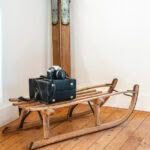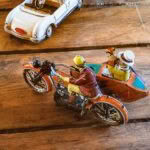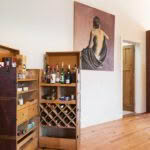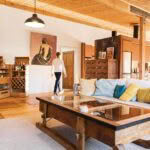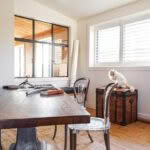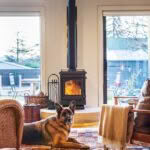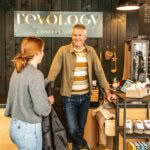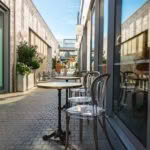Made to last: This Wānaka-based couple is embracing circular design with flax and plant-based resin
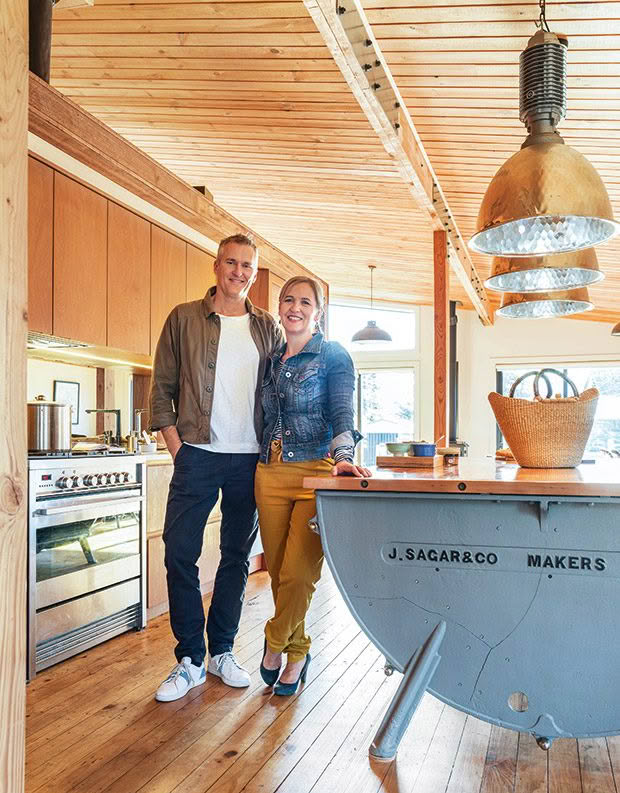
Alex Guichard and Monique Kelly.
Once upon a time, artisans made things to last forever. Then, plastics and built-in obsolescence took over. Meet a couple spinning golden-hued chair legs from flax and glass-perfect transparent seats from plant-based resin for chairs designed to last generations.
Words: Kate Coughlan Photos: Rachael McKenna & Brian High
In early March last year, Alex Guichard, a designer and entrepreneur, stepped off a plane in the south of France on his way to a large trade show where he was to launch a chair for the European hospitality market.
He had 40 appointments booked with potential clients and, after three flights and 35 hours in the air, he was eager to get to work. First, he needed to clear the deluge of texts lighting up his mobile phone screen. “The trade show is cancelled!” “The virus is spreading rapidly!” “Book flights home immediately!”
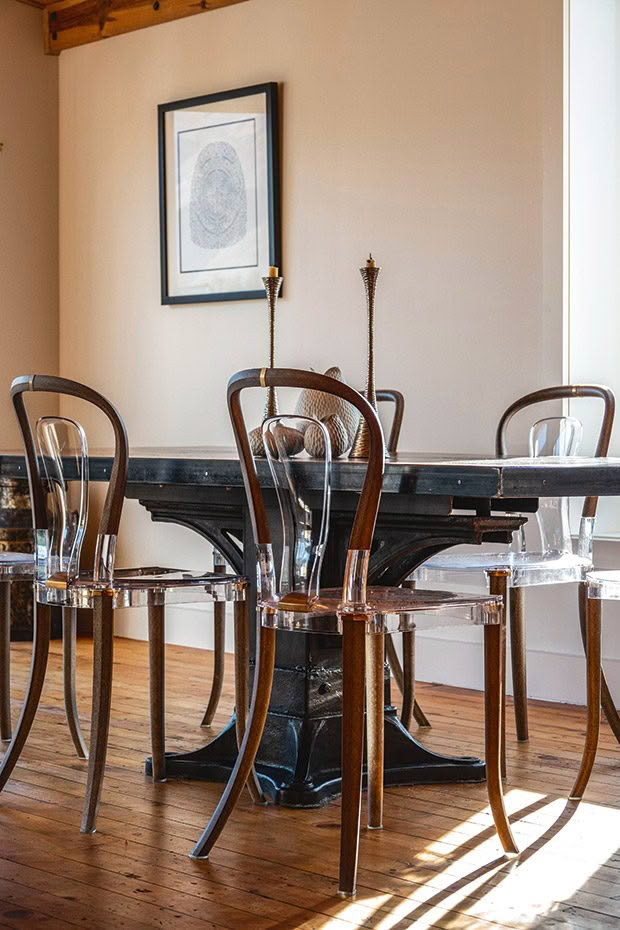
Revology chairs are created from natural flax fibres mixed with resin using a process similar to that used for carbon fibre manufacture. Alex says his method is revolutionary as it requires less energy and operates at a lower temperature than traditional composite manufacturing while delivering the strength necessary for chair legs. The transparent chair seats are from a vegetable byproduct.
Alex, and millions of others worldwide, made new plans. His included a hasty visit to his mother and boyhood home in Lyon. Then it was back to Wānaka, home base for him and his wife Monique Kelly and their two children, Romy and Carter, since 2014. “Not great timing,” says Alex, “but in the big scheme of things, it is okay.”
In Alex and Monique’s world, the big picture is the only picture. For the past seven years, they’ve worked on revolutionizing manufacturing to make everyday items from natural or renewable materials that will last forever. The chair that was to make its debut at the trade fair is made from flax fibres and a byproduct of the corn industry. Each of its 32 component parts is repairable.
“We are thinking about how the chair will function when it is passed to its second and third generation of users,” says Alex.
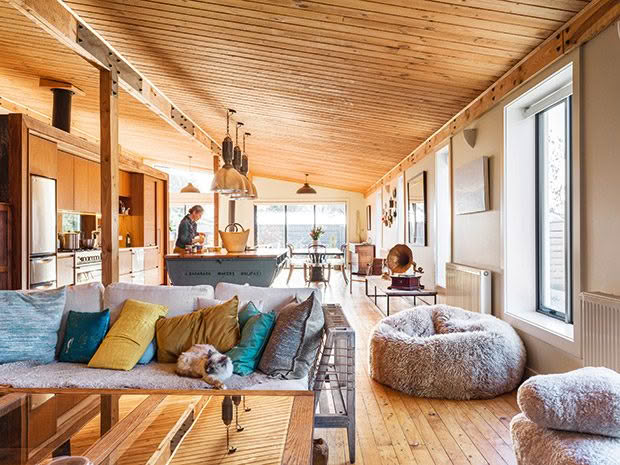
Monique and Alex’s Wānaka house has had a history of different uses. It was a joinery in the 1950s. Then it was converted to a gym and later a backpackers’ hostel before being renovated as a home by its previous owners. The kitchen benchtop is from old rimu bedposts, and the grey steel ends are from the stone casing of the grindstone used for sharpening saws during the building’s joinery factory days.
In linear design, products are used once and then thrown out. “Out” always being a landfill. In a recyclable world, products are used once and go into a recycling process that is expensive and finite, as it eventually ends in a dump.
Imagine a world where everything could be either repaired or reused as a component of another, perhaps entirely different, product. This, the challenge of a circular design philosophy, is embraced every day by Alex and his design team. The goal is to eliminate waste and pollution and keep products, with an infinity of uses, forever spiraling above the landfill.
“We ask ourselves: ‘What happens when this breaks? How do we make this fixable? What else could we use this piece to make if it does break and can no longer be used as part of this product?’”
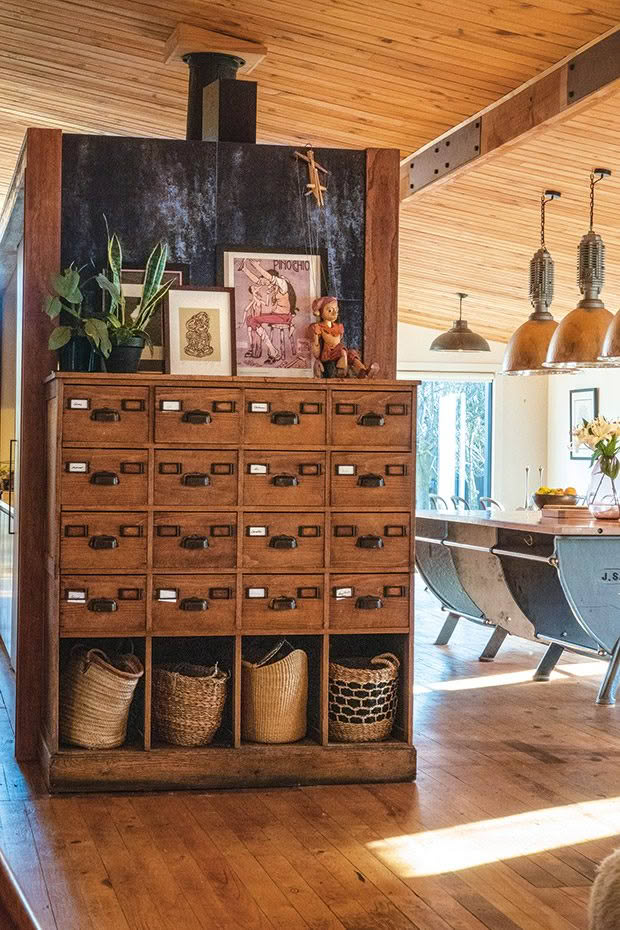
Pre-pandemic, their regular trips to Europe generally resulted in “treasures” shipped home, such as the hand-carved marionette from Marionety Truhlar in Prague, which sits on top of an old filing cabinet picked up at a second-hand market in the French Alps. The factory lamps also come from France.
If this wasn’t a tough enough challenge, Alex’s determination to avoid fossil fuels meant using only renewable natural materials. It took six to seven years to develop a process to transform natural fibres into products with the required strength-to-weight ratio and another four years to build the chair’s components.
“We have done it. Our process uses flax and a bio-resin, a byproduct of the agricultural industry — a kind of waste sugar. And through an induction heating process, we can turn natural materials into strong, useful objects. Leftover material from the manufacturing process is negligible — a tiny amount of waste —which is unusual in most manufacturing processes.”
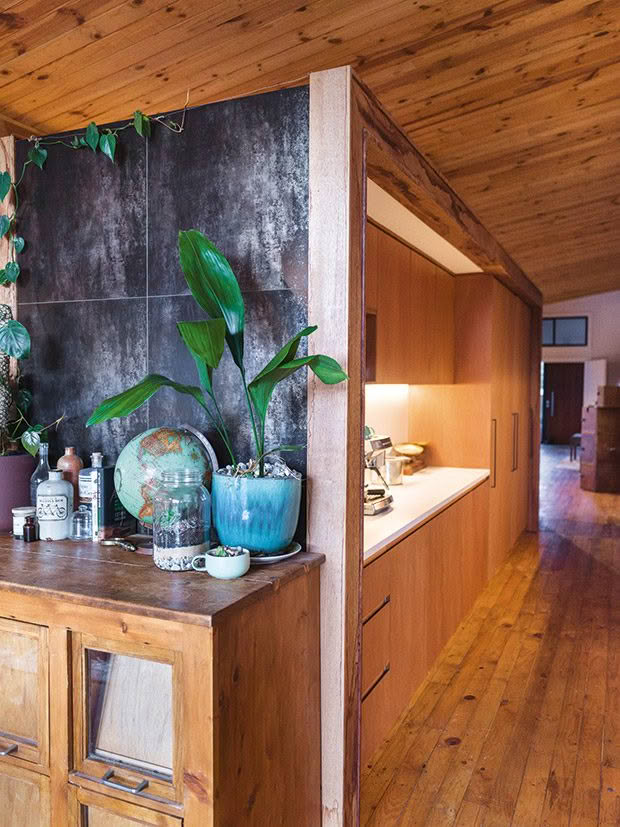
The home’s long living area includes the kitchen, pantry, laundry and two seating areas and runs from one end of the house to the other. Alex and Monique decided to buy the house within minutes of walking into it seven years ago. Antiques and well-loved furniture appeal to them.
Incroyable, indeed. Who is this couple, and how did they fetch up in Wānaka with these audacious goals?
Meet Alex, a Frenchman who showed such musical talent at five he was taken to study at one of France’s top two academies of music and dance (the Conservatoire de Lyon), where music tuition filled every weekday from 8am until 1pm, followed by afternoons of regular schoolwork.
And Invercargill-born Monique, who set her sights on an international career while completing her law and French degrees at the University of Otago. After graduating — and to improve her French to the required bilingual level — she moved to Lyon to teach English in a secondary school. She was headed for an internship at the International Labour Organization in Geneva, where she still works — remotely these days, of course.
- The skis and sled were found at a brocante (a second-hand market) in France and the camera is Alex’s father’s old Olympus.
- The wind-up toys, which date back to the early 20th century, interest Alex for the longevity of their design.
- The pre-World War II gramophone is still in working order.
- The wood and leather bar was handmade in France.
- The sled, now a coffee table, has had several lives and was first used in the French Alps to transport goods during winter.
- Nougat, one of three family cats, makes himself comfortable in Alex’s office.
- Solo the german shepherd by the hearth, which is the grindstone from the old joinery’s fire.
Monique went to France intending to be there a year, but she stayed for 15. “That’s what happens when you meet a Frenchman in a bar, and you both fall in love,” says Alex. They married four months after meeting, and Monique successfully pursued her international law career while based an hour from Geneva.
Before Alex met Monique, he’d parted company with music – forever, as it turned out. At 14, he’d hoped to become a professional flautist. By 17, he wanted to win the Tour de France. He was mad about cycling, road racing, in particular. For seven years, he trained as an elite cyclist in a development squad, one of France’s top 20 riders in his age group.
“However, my body said, ‘Alex, it is not going to be a good idea to keep going.’ My knees were just not up to it.”
Alex raced on French-manufactured bikes, but China and Taiwan’s cheap machines were beginning to challenge local French manufacturers. While he was racing, he sometimes trialed bikes for manufacturers and became interested in how they were made. He saw an opportunity to develop a competitively priced frame using a super-fast processing method.
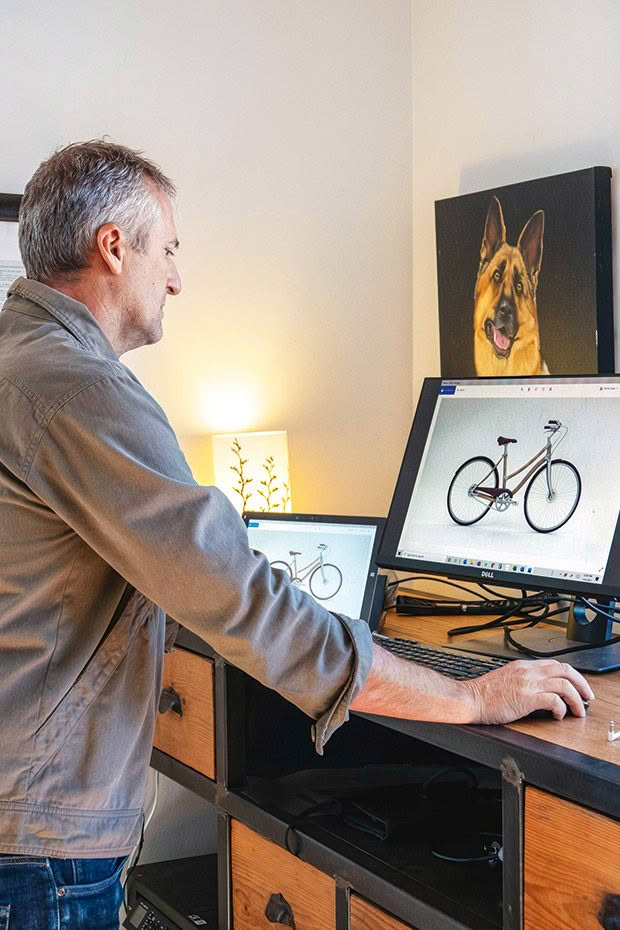
Alex works with his designers, located in several places around the world, on the three prototypes of the Revology bike planned for release later in 2021.
“France had a huge bike industry. Peugeot Cycles, the leading manufacturer at the time, was making two million bikes per year. So, I pitched my idea to them. I was quite surprised when they said, ‘Okay, so we finance you to create your little company and try to make a bicycle frame in two to three minutes’ manufacturing time.’
“And we did it. To be honest, I think Peugeot initially thought, ‘Oh, he’s a kid, let’s see what he can do and let’s worry about the patent later if it comes on the market.’” Alex might have been “a kid”, but he was not a silly one. He had registered a patent for his design. “
We passed the test, we manufactured the bike in two minutes per unit-time, and it was very cheap — about €45 to €50 — so we had a competitive solution vis-a-vis China. The CEO of Peugeot said, ‘We want to acquire your patent,’ and I said, ‘Sure, why not? If you pay the price, why not?’” Basically, they made an offer, and it was so ridiculous I said, ‘No. I prefer to stay as we are as a little design studio.’
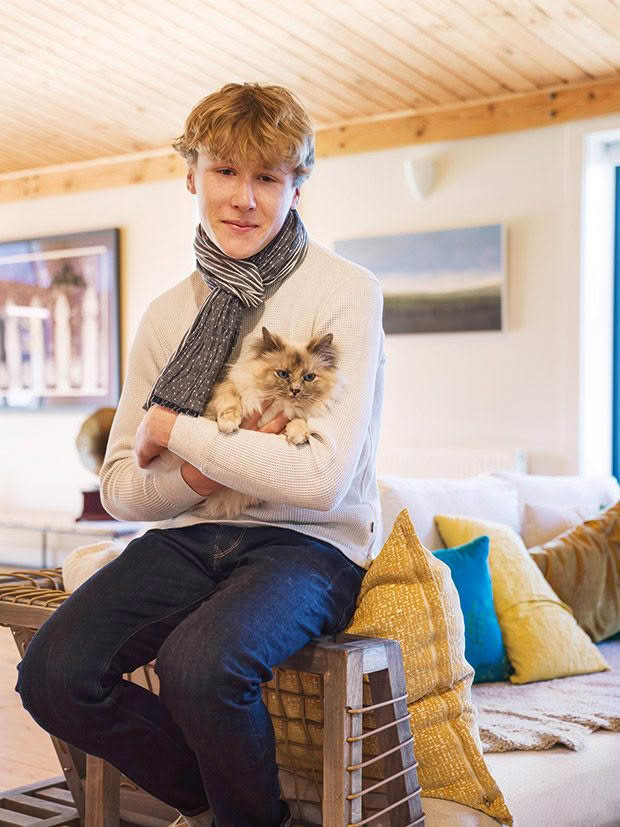
Son, Carter, with Ivoire.
“He said: ‘No, you do not understand. If you do not accept and sell us your patent, we are not going to sell the bike, and you are going to die, and we are going to acquire your company for nothing. So you should accept our offer.’”
Alex refused and took a court case against Peugeot Cycles, supported by one of his shareholders, who was equally insulted by Peugeot’s arrogance. Alex won (and was reimbursed for the research and development costs) three years later, but the competitively priced French-built bike project was dead: unable to be resuscitated.
Peugeot Cycles faded into liquidation and fired 1000 people. Today, most French bikes are imported from Asia. “I tell you this story,” says Alex, “because it is interesting, and it helped develop my thinking.” It also taught Alex that even without an engineering or design degree, he could think like an engineer and designer. It also taught him a great deal about composite materials, carbon fibre and heat induction processes.
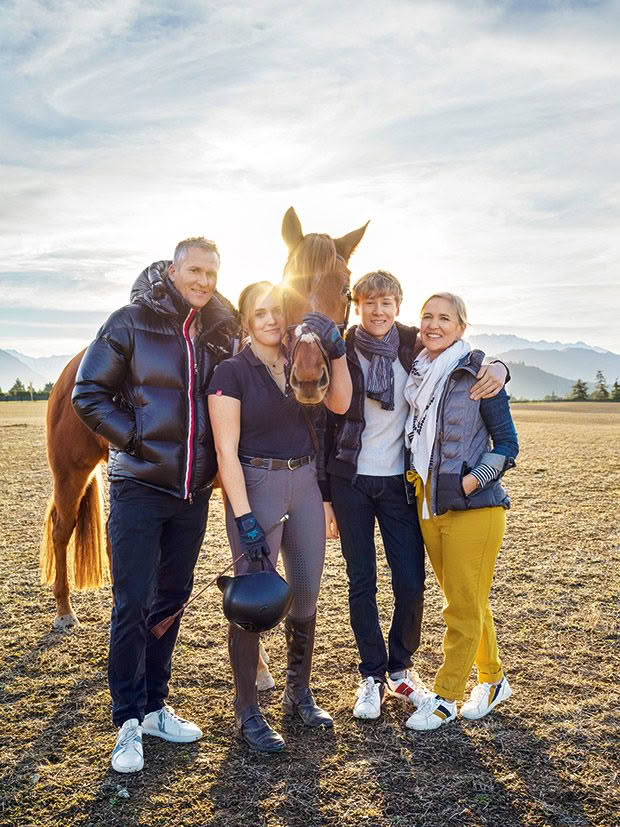
Daughter Romy prefers her four-legged ride, a horse named Queen.
Meanwhile, Monique established her career at the International Labour Organization in the policy and standards team, establishing an integrated approach to many complex areas, including occupational safety and health, migrant health, seafarers, child labour and forced labour. Her strong sense of social justice and fairness has led her, today, to the belief that it is the environment that is without a voice and needing her advocacy.
Alex established a second company, called RocTool, for processing composite materials and plastics with less energy than conventional methods using inductive heating. It was successful and, when it listed on the Paris Euronext stock market in 2013, the company had 40 employees, and Alex’s life was all about meetings, venture capitalists, international flights, and tight timetables.
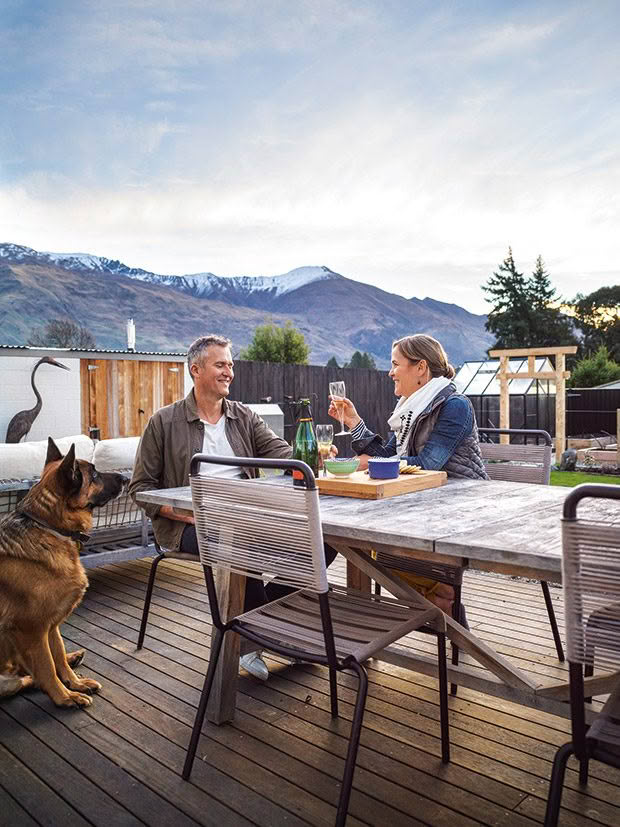
Then came the point when Alex told Monique he’d had enough, and business success didn’t interest him anymore. He proposed that they sell the company and head off for the one place where life seemed to be relaxed — where he and Monique had taken their children every year to be with their New Zealand grandparents; a small alpine town called Wānaka.
The sale of RocTool went very well, allowing the family to relocate to Wānaka and spend time developing alternatives to fossil fuel-based manufacturing. Seven years later, the chair (Design #1) is in production. It is available for sale in New Zealand (revologyconceptstore.nz) and only awaiting the post-pandemic reopening of European entertainment venues for an international launch. Step one of Alex’s goal to create eternal objects we all need and things that will not become obsolete once a newer gadget comes out? Tick.
So, now, step two. For Alex, project Design #2 is once again all about the bike. Covid-19, he notes, might have been bad for café chairs, but it has been a boon for bikes. People have a more conscious approach to their travel footprint, and ever more European cities are about to ban cars in their inner cities.
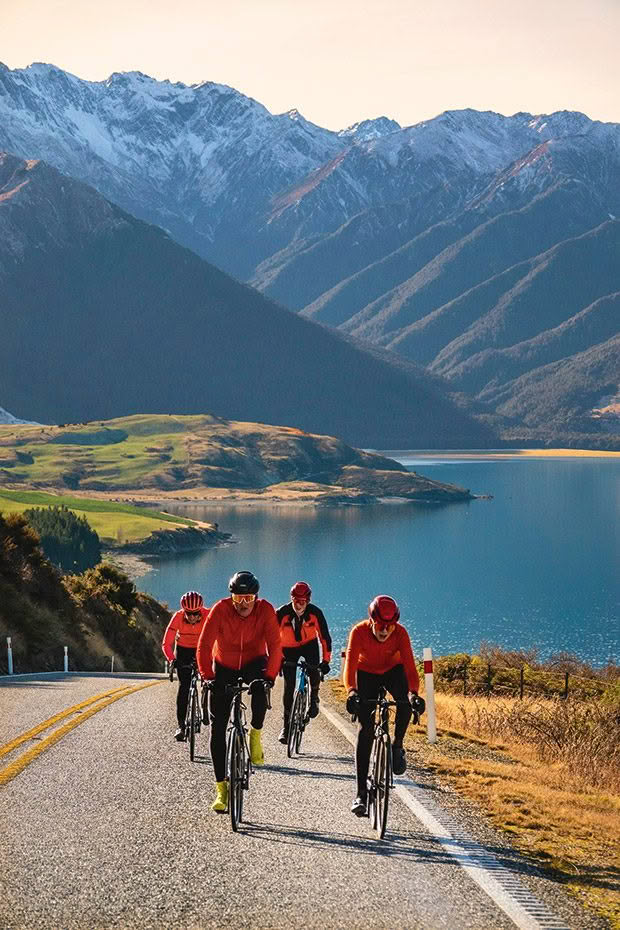
Alex still cycles for fun but his greatest involvement these days is coaching Carter and his Mount Aspiring College race team, training by Lake Hawea.
He will have three proto-type frames ready by Christmas. One is made from all-natural flax and linen fibre, one from new carbon fibre (a lighter footprint than aluminium or steel) and the third from recycled carbon fibre from decommissioned aircraft and windmill blades.
He and his designers (located at various places worldwide) spend much time considering what happens to their bikes when they break, when the battery dies (for electric models) and when they cannot be repaired. Carbon fibre can now be fixed (a recent advance), but if Alex takes that route, how can an arrangement to recycle the bike at the end of its lifecycle be guaranteed? These are complex challenges without obvious solutions.
However, Alex and Monique are adamant about one thing. They will not go into the market with a product that cannot be repaired, or reused when they can’t guarantee an end-of-life care package. And that won’t be a landfill ending.
CIRCULAR DESIGN
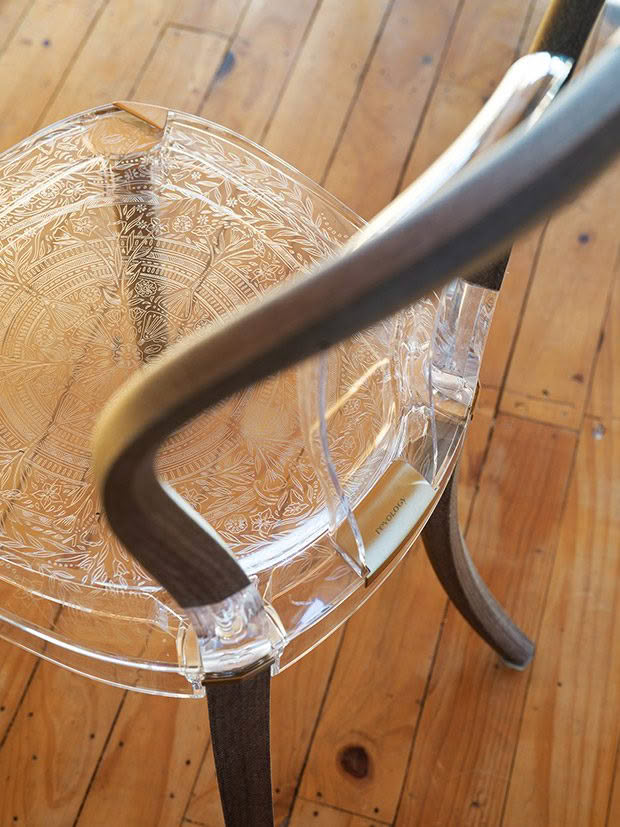
The seat of the Revology chair (used in Wānaka’s Precinct) is etched in a lace-like pattern designed by local artist Leigh Cooper, telling the story of linen flax.
The principles of circular design are rigorous:
– Choose materials that can be infinity-recycled or that are natural and renewable.
– Design objects to minimize waste during manufacturing.
– Think about the entire lifecycle of a product; make it last by making it easier to repair or repurpose.
– Recycling is a last resort.
FOREVER AND EVER
Monique says built-in obsolescence arose from measures introduced after the Great Depression requiring manufacturers to offer a lifetime guarantee. The goal of stimulating consumer demand led to the unintended consequence of a new focus on creating products that lasted only the length of the guarantee.
Before that, craftsmen designed products to be repairable and last for generations. The development of modern plastics, and cheap, mass, and fast manufacturing in the past 100-plus years introduced throwaway or single-use consumer items.
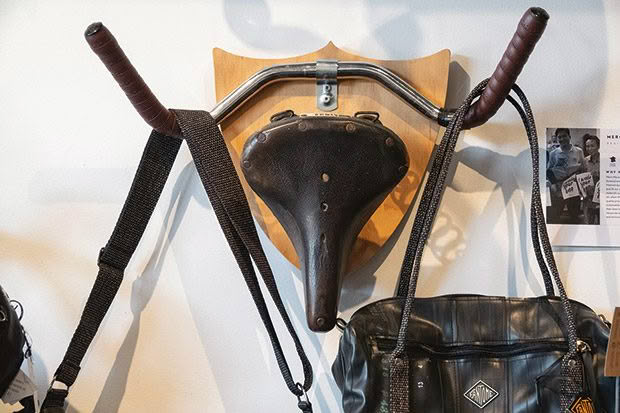
In the Revology shop, bike parts are used to display bags made from inner tubes by French brand, Fantome.
There are many combs in the world’s museums dating back millennia — one to 1500BC — which still fulfil the functions of a comb. Modern plastic combs do not generally last more than a year or two before becoming landfill.
WAO TRUST
In 2018 Monique and Wānaka local Arna Craig established the Wao Trust to educate, inspire and enable New Zealand to accelerate towards a carbon-zero, regenerative future. “A lot is going on at the high level, and we are here to support grassroots change — we need a pincer movement of top-down and bottom-up to make a difference.
“We wanted to give back as a company and help develop communities transition to a regenerative future,” says Monique. “We use the United Nations Sustainable Development goals to see not just how we can be more sustainable but how we can help build a society that is giving back more to the environment than we are extracting from it.”
Many Wao projects are collaborations or partnerships with community groups or companies in which the trust brings expertise and educational help to achieve a carbon-zero footprint. Monique says grassroots or community-based groups can reach out to the trust, which now has 40 members and works with several local groups, to see what concrete steps can be taken towards a lighter future footprint. The fourth annual Wao Summit will be held in Wānaka from 26 to 31 October, with more than 40 events.
Love this story? Subscribe now!
 This article first appeared in NZ Life & Leisure Magazine.
This article first appeared in NZ Life & Leisure Magazine.
